#Advanced Java concepts
Text
Mastering Object-Oriented Programming in Java: A Step-by-Step Guide
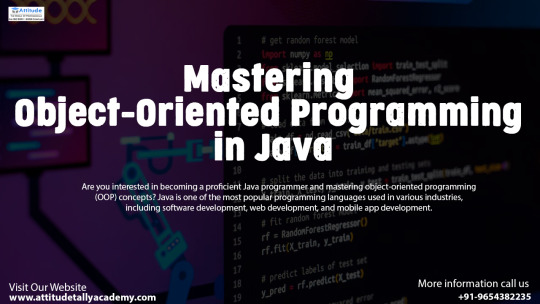
Introduction:
Are you interested in becoming a proficient Java programmer and mastering object-oriented programming (OOP) concepts? Java is one of the most popular programming languages used in various industries, including software development, web development, and mobile app development. Understanding OOP principles in Java is essential for building scalable, maintainable, and efficient software solutions. In this blog post, we'll provide a step-by-step guide to mastering object-oriented Java programming tutorial, covering fundamental concepts and practical tips to help you become a confident Java developer.
Understand the Basics of Java Programming:
Before diving into OOP concepts, it's important to have a solid understanding of basic Java programming syntax, data types, variables, operators, and control flow statements.
Enrolling in a Java programming course or attending training sessions at a reputable institute or training centre can help you build a strong foundation in Java programming.
Learn Object-Oriented Programming (OOP) Fundamentals:
Object-oriented programming is a programming paradigm based on the concept of "objects," which represent real-world entities. Learn key OOP principles such as encapsulation, inheritance, polymorphism, and abstraction.
Explore how classes and objects are used to model entities and behaviours in Java programs. Understand the relationships between classes, including inheritance and composition.
Create and Use Classes and Objects:
Practice creating classes and objects to represent entities and behaviours in your Java programs. Define class properties (attributes) and methods (behaviours) to encapsulate data and functionality.
Learn how to instantiate objects from classes and use them to perform operations and interact with other objects in your program.
Implement Inheritance and Polymorphism:
Understand the concept of inheritance, where a subclass (or child class) inherits properties and behaviours from a superclass (or parent class). Use inheritance to create class hierarchies and reuse code.
Explore polymorphism, which allows objects of different types to be treated as objects of a common superclass. Learn how to implement method overriding and method overloading to achieve polymorphic behaviour.
Practice Encapsulation and Abstraction:
Embrace the principle of encapsulation, which involves bundling data and methods together within a class and hiding internal implementation details from external users. Use access modifiers (e.g., private, public, protected) to control access to class members.
Master abstraction, which involves focusing on essential features while hiding unnecessary details. Define abstract classes and interfaces to establish contracts for implementing classes.
Use Java Standard Library and Frameworks:
Familiarize yourself with the Java Standard Library (Java API) and popular frameworks such as JavaFX, Spring, and Hibernate. Explore built-in classes and utility methods provided by the Java platform for common tasks such as input/output operations, collections, and networking.
Learn how to leverage third-party libraries and frameworks to streamline development and enhance the functionality of your Java applications.
Practice Problem-Solving and Design Patterns:
Solve programming challenges and practice implementing algorithms and data structures in Java. Strengthen your problem-solving skills by participating in coding competitions or working on real-world projects.
Study design patterns, which are proven solutions to recurring design problems in software development. Learn common design patterns such as Singleton, Factory, Observer, and Strategy, and apply them to design robust and maintainable Java applications.
Stay Updated and Engage with the Java Community:
Keep abreast of the latest developments in the Java ecosystem, including updates to the language, new features, and emerging trends. Follow blogs, forums, and social media channels dedicated to Java programming to stay informed.
Participate in online communities, user groups, and forums where you can ask questions, share knowledge, and collaborate with fellow Java developers. Joining coding communities can provide valuable support and networking opportunities.
By following this step-by-step guide and practicing regularly, you can master Java OOP fundamentals and become a proficient Java developer. Whether you're considering enrolling in a Java programming course or seeking training at a reputable institute or training centre, continuous learning and hands-on practice are essential for advancing your skills and pursuing a successful career in computer science. Happy coding!
Suggested Blog:
C++ development process
Computer Science Foundations
Advanced Java concepts
0 notes
Text
The Roadmap to Full Stack Developer Proficiency: A Comprehensive Guide
Embarking on the journey to becoming a full stack developer is an exhilarating endeavor filled with growth and challenges. Whether you're taking your first steps or seeking to elevate your skills, understanding the path ahead is crucial. In this detailed roadmap, we'll outline the stages of mastering full stack development, exploring essential milestones, competencies, and strategies to guide you through this enriching career journey.

Beginning the Journey: Novice Phase (0-6 Months)
As a novice, you're entering the realm of programming with a fresh perspective and eagerness to learn. This initial phase sets the groundwork for your progression as a full stack developer.
Grasping Programming Fundamentals:
Your journey commences with grasping the foundational elements of programming languages like HTML, CSS, and JavaScript. These are the cornerstone of web development and are essential for crafting dynamic and interactive web applications.
Familiarizing with Basic Data Structures and Algorithms:
To develop proficiency in programming, understanding fundamental data structures such as arrays, objects, and linked lists, along with algorithms like sorting and searching, is imperative. These concepts form the backbone of problem-solving in software development.
Exploring Essential Web Development Concepts:
During this phase, you'll delve into crucial web development concepts like client-server architecture, HTTP protocol, and the Document Object Model (DOM). Acquiring insights into the underlying mechanisms of web applications lays a strong foundation for tackling more intricate projects.
Advancing Forward: Intermediate Stage (6 Months - 2 Years)
As you progress beyond the basics, you'll transition into the intermediate stage, where you'll deepen your understanding and skills across various facets of full stack development.
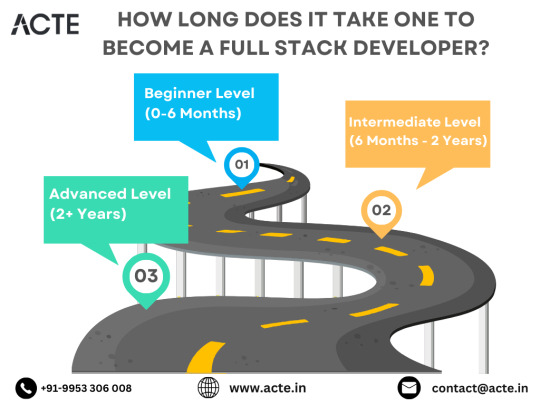
Venturing into Backend Development:
In the intermediate stage, you'll venture into backend development, honing your proficiency in server-side languages like Node.js, Python, or Java. Here, you'll learn to construct robust server-side applications, manage data storage and retrieval, and implement authentication and authorization mechanisms.
Mastering Database Management:
A pivotal aspect of backend development is comprehending databases. You'll delve into relational databases like MySQL and PostgreSQL, as well as NoSQL databases like MongoDB. Proficiency in database management systems and design principles enables the creation of scalable and efficient applications.
Exploring Frontend Frameworks and Libraries:
In addition to backend development, you'll deepen your expertise in frontend technologies. You'll explore prominent frameworks and libraries such as React, Angular, or Vue.js, streamlining the creation of interactive and responsive user interfaces.
Learning Version Control with Git:
Version control is indispensable for collaborative software development. During this phase, you'll familiarize yourself with Git, a distributed version control system, to manage your codebase, track changes, and collaborate effectively with fellow developers.
Achieving Mastery: Advanced Phase (2+ Years)
As you ascend in your journey, you'll enter the advanced phase of full stack development, where you'll refine your skills, tackle intricate challenges, and delve into specialized domains of interest.
Designing Scalable Systems:
In the advanced stage, focus shifts to designing scalable systems capable of managing substantial volumes of traffic and data. You'll explore design patterns, scalability methodologies, and cloud computing platforms like AWS, Azure, or Google Cloud.
Embracing DevOps Practices:
DevOps practices play a pivotal role in contemporary software development. You'll delve into continuous integration and continuous deployment (CI/CD) pipelines, infrastructure as code (IaC), and containerization technologies such as Docker and Kubernetes.
Specializing in Niche Areas:
With experience, you may opt to specialize in specific domains of full stack development, whether it's frontend or backend development, mobile app development, or DevOps. Specialization enables you to deepen your expertise and pursue career avenues aligned with your passions and strengths.
Conclusion:
Becoming a proficient full stack developer is a transformative journey that demands dedication, resilience, and perpetual learning. By following the roadmap outlined in this guide and maintaining a curious and adaptable mindset, you'll navigate the complexities and opportunities inherent in the realm of full stack development. Remember, mastery isn't merely about acquiring technical skills but also about fostering collaboration, embracing innovation, and contributing meaningfully to the ever-evolving landscape of technology.
#full stack developer#education#information#full stack web development#front end development#frameworks#web development#backend#full stack developer course#technology
6 notes
·
View notes
Note
Hi , first thanks for the experience you share , you really motivate me to make progress in my coding journey , and as a beginner who only learned the basics of html and css in college -i'm a first year css student- I'm a bit lost , i'm currently doing the html and css course in freecodecamp and i want to learn JavaScript after but idk if it's a good decision/path to take , what do you recommend?any recourses/free courses / websites ? And do you think that it's better to learn css and html well before moving to java or can i learn them simultaneously? , Thank you in advance.

Hiya! ✨ Good question! First of all, well done on currently working on the the HTML and CSS course on FreeCodeCamp.org!! I'll break it all down for you!💗
🔎 - "I'm currently doing the html and css course in FreeCodeCamp and I want to learn JavaScript after but idk if it's a good decision/path to take, what do you recommend?"
Yes, it is generally a good idea to learn JavaScript after learning HTML and CSS. As you may know, HTML is used to structure the content of a web page, while CSS is used to style the content of a web page. So it would only make sense to learn JavaScript as it is a programming language that is used to add interactivity to web pages and create web applications.
By learning HTML and CSS first, you will have a solid foundation for creating the structure and design of your web pages. Then, when you learn JavaScript, you will be able to add interactive elements and functionality to your web pages, such as forms, animations, and other features that make your website more dynamic.
In general, it is a good idea to learn the core technologies of the web (HTML, CSS, and JavaScript) in the following order:
HTML
CSS
JavaScript
This will give you a strong foundation in web development and enable you to build basic web pages and applications. From there, you can continue to learn more advanced technologies and frameworks as needed.
🔎 - "Any resources / Free courses / Websites?"
I wasn't sure if you meant only JavaScript, so here are some JavaScript resources I personally like!
Websites
[LINK] - MDN Web Docs: This is a comprehensive resource for learning JavaScript, provided by the developers of the Firefox web browser. It includes tutorials, reference materials, and code examples.
[LINK] - W3Schools: This website offers a variety of JavaScript tutorials, as well as interactive examples that allow you to try out code in your browser.
[LINK] - Codecademy: This website offers a series of interactive JavaScript tutorials, as well as a range of other programming courses.
[LINK] - Javascript.info - Learn JavaScript, starting from scratch and go on to advanced concepts like OOP. The site concentrates on the language itself here, with the minimum of environment-specific notes.
[LINK] - SoloLearn: This website offers a series of interactive JavaScript tutorials, as well as a range of other programming courses.
Youtube Videos
[LINK] - Learn JavaScript - Full Course for Beginners
[LINK] - JavaScript Programming - Full Course
[LINK] - Build 15 JavaScript Projects - Vanilla JavaScript Course
[LINK] - All of FreeCodeAcademy.org's JavaScript videos
🔎 - "Do you think that it's better to learn CSS and HTML well before moving to Java or can I learn them simultaneously?"
Oh definitely if you're beginner, just focus right now on getting to grasp how to code.programming and once doing a few projects, see if you're comfortable learning Java! At my apprenticeship, they taught HTML, CSS and JavaScript first before introducing us to Java/C# and I was very thankful for that, to be honest!
After getting more confident, look into Java. Follow some beginner Java tutorials and see if you're comfortable starting Java, because for me Java and C# are basically the same and my work required me to learn C# and it looked like gibberish to me at the beginning but I slowly got myself to learn it.
I hope I answered you questions! If not, let me know and I'll try answer best I can! My advice are little bit my opinion and my views! Definitely do you're own research on the Java stuff! Remember, don't rush things just because you want to learn everything or to finish an assignment! 🥰🙌🏾
#my asks#coding#code#codeblr#program#programming#programmer#student#comp sci#study#software developer#100 days of code#studyblr#sharing is caring#study aesthetic#studying#productivity#studies#computer science#how to code#resources#programming resource#computing#100 days of productivity#academia#javascript#html#css#java
57 notes
·
View notes
Text
Mastering Java: Your Comprehensive Guide to Programming Excellence
Embarking on the journey of mastering Java is akin to entering a realm of endless possibilities. Java, a versatile and widely-utilized programming language, offers a broad spectrum of applications, from crafting web and mobile applications to powering robust enterprise systems. Whether you are a novice in the realm of coding or a seasoned programmer looking to broaden your skill set, the path to proficiency in Java is an exciting one.

In this comprehensive guide, we will be your guiding light through the intricacies of Java, starting from the foundational basics and progressing to the more advanced aspects of the language. Our objective is to equip you with the knowledge and skills that form a robust and unshakable foundation for your journey into the vibrant world of Java. Fasten your seatbelt as we embark on this exhilarating exploration, charting a course that will empower you to thrive in the ever-evolving landscape of software development.
Here's a 8-step guide to effectively learn Java
Step 1: Setting Up Your Development Environment
Your journey to becoming a proficient Java developer commences with setting up your development environment. The essential components are the Java Development Kit (JDK) and an Integrated Development Environment (IDE) like Eclipse or IntelliJ IDEA. These tools aren't just convenient; they're the gears that will drive your Java programming endeavors. They streamline the coding process, provide useful features, and offer an organized workspace, making your coding experience efficient and enjoyable.
Step 2: The Foundation - Learning the Basics
With your development environment ready, it's time to delve into the fundamental building blocks of Java. Begin by acquainting yourself with data types, variables, operators, and control structures. These are the nuts and bolts of the language, and a solid grasp of these concepts is essential. You'll find an abundance of online tutorials and beginner-friendly Java books to assist you at this stage.
Step 3: Navigating the World of Object-Oriented Programming (OOP)
The object-oriented programming (OOP) approach is well known in Java. To harness the true power of Java, immerse yourself in the world of OOP. Understand the concepts of classes, objects, inheritance, encapsulation, and polymorphism. This knowledge forms the bedrock of Java programming and enables you to design efficient, organized, and scalable code.
Step 4: Mastering Data Structures and Algorithms
Data structures (such as arrays, lists, and sets) and algorithms are the secret sauce behind solving real-world problems efficiently. As you progress, dive into the world of data structures and algorithms. These are the tools that will empower you to handle complex tasks and optimize your code. They're your go-to assets for creating efficient and responsive applications.
Step 5: The Art of Exception Handling
Java boasts a robust exception-handling mechanism. Understanding how to handle exceptions properly is not just an add-on skill; it's a vital aspect of writing reliable code. Exception handling ensures that your code gracefully manages unexpected situations, preventing crashes and delivering a seamless user experience.
Step 6: Exploring Input and Output Operations
In this step, you'll explore the realm of input and output (I/O) operations. Mastering I/O is crucial for reading and writing files, as well as interacting with users. You'll gain the ability to build applications that can efficiently process data and communicate effectively with users.
Step 7: Conquering Multi tasking
Java's support for multi tasking is a significant advantage. Understanding how to manage threads and synchronize their actions is vital for creating concurrent applications. Multithreading is the key to developing software that can handle multiple tasks simultaneously, making your applications responsive and scalable.
Step 8: Building Projects and Real-World Practice
Theory is only as valuable as its practical application. The final step involves applying what you've learned by building small projects. These projects serve as a proving ground for your skills and provide valuable additions to your portfolio. Whether it's a simple application or a more complex project, the act of building is where the real learning takes place.

As you step into this vibrant realm of Java, remember that continuous learning is the key to staying relevant and effective in the ever-evolving field of software development. Be open to exploring diverse applications, from web development to mobile apps and enterprise solutions, and never underestimate the power of hands-on practice. Building projects, no matter how small, will solidify your knowledge and boost your confidence.
In your quest to master Java, ACTE Technologies stands as a valuable ally. Their expert guidance and comprehensive training programs will sharpen your skills, boost your confidence, and pave the way for a rewarding career in software development. Whether you're embarking on your Java journey or looking to take your skills to the next level, ACTE Technologies offers the resources and support you need to thrive in the world of Java programming.
So, with Java as your trusty companion, and ACTE Technologies as your guide, the possibilities are boundless. Your journey is just beginning, and the world of software development awaits your innovation and expertise. Best of luck on your path to mastering Java!
9 notes
·
View notes
Text
Revanth Technologies provides Java Full Stack online training in Hyderabad India
📞 Ready to Supercharge Your Career? Contact Us Today! 📞
For more details, course information, or to enroll, reach out to us at:
📱 Call / WhatsApp: +91 9290971883 or +91 9247461324
🌐 Visit Our Website: https://www.revanthtechnologies.com
🌟 Explore the World of Java and Java Full Stack Development with Revanth Technologies! 🌟
Are you ready to elevate your career in the dynamic world of Java and Java Full Stack development? Look no further than Revanth Technologies, your gateway to exceptional online training in Hyderabad, India!
🚀 Join our Comprehensive Java and Java Full Stack Online Training Program! 🚀
✅ Master Java Programming: Learn the fundamentals and advanced concepts of Java programming, including core Java, Java EE, and more!
✅ Full Stack Development: Dive into front-end and back-end development, mastering essential technologies like HTML, CSS, JavaScript, Spring, Hibernate, and more!
✅ Real-world Projects: Gain hands-on experience by working on real-world projects, enhancing your practical skills and boosting your confidence!
Why Choose Revanth Technologies for Your Training?
🔹 Expert Instructors: Learn from industry experts with extensive experience and deep knowledge in Java and Full Stack development.
🔹 Flexible Online Training: Access our online training platform from the comfort of your home, fitting seamlessly into your schedule.
🔹 Interactive Learning: Engage in interactive sessions, discussions, and Q&A sessions to clarify doubts and reinforce your understanding.
🔹 Career Guidance: Receive guidance on job placement, interview preparation, and career advancement to help you achieve your professional goals.
Don't miss out on this opportunity to take your career to new heights with Revanth Technologies. Join us now and unlock a world of possibilities in Java and Java Full Stack development! 🌟
#javafullstack#javafullstackcourse#JavaFullStackTraining#JAVAOnlineTraining#onlinejavatraining#javaonlineclasses#javaonlinetraininginindia
10 notes
·
View notes
Text
Java Training | Java Training Institute | Ghaziabad- India
Java is one of the best programming languages that you can learn. It has several benefits for developers and organizations. Java programming is used to focus on simplicity, portability, and security. It can also used to develop a wide range of applications, including desktop software, web applications, mobile apps, enterprise systems, and embedded systems. Java is an object-oriented language, which means it supports concepts like classes, objects, inheritance, and polymorphism. Joining an institute provides a structured learning environment with a well-defined curriculum. It ensures that you learn Java concepts in a logical order, building a strong foundation and gradually progressing to more advanced topics.
Elevate your career with our Java training program that combines theoretical knowledge with hands-on practice. Microvision Technology is the Best Java Training Institute in Ghaziabad. We provide the best knowledge and experience to the students. We provide 3-day Free Demo Classes, 15-day Classes For Freshers/ Beginners, Live- Projects, Live URLs, Live- Coding, and yes Free Web- Designing Classes. For more information and exciting offers go check our site or directly give us a call at 8077715318. Join our Java training and embark on a journey towards becoming a sought-after software engineer!
2 notes
·
View notes
Text
Path to Selenium Mastery: Your Comprehensive Guide to Automated Testing
In today's dynamic digital landscape, ensuring the quality and reliability of web applications is paramount. Enter Selenium, the premier automation testing framework that has transformed the way web applications are tested. Whether you're a seasoned QA engineer or a budding tester aiming to elevate your skills, mastering Selenium unlocks a myriad of opportunities in automated testing.

This comprehensive guide is your roadmap to mastering Selenium and advancing your testing expertise.
Foundations of Selenium Mastery
Embarking on your Selenium journey requires a strong understanding of its fundamentals and automated testing principles. Start by familiarizing yourself with the core concepts of Selenium, including the Selenium WebDriver and its architecture, and how it interacts with web browsers to automate testing tasks. This foundational knowledge sets the stage for your Selenium proficiency.
Selecting Learning Resources
Choose reliable and comprehensive learning resources to support your Selenium learning journey. With a multitude of online tutorials, courses, and documentation available, platforms like Udemy, Coursera, and Pluralsight offer tailored courses catering to various skill levels. Find resources that resonate with your learning style and preferences to maximize your learning experience.
Hands-on Learning Experience
Practice is paramount when it comes to mastering Selenium. Dive into hands-on practice by setting up your development environment, downloading the Selenium WebDriver, and crafting test scripts in your preferred programming language, whether it's Java, Python, or JavaScript. Through practical exercises, you'll deepen your understanding of Selenium's capabilities and functionalities.
Building Practical Projects
Apply your newfound knowledge by undertaking small-scale Selenium projects. Start with simple tasks like automating form submissions or navigating web pages, gradually progressing to more complex scenarios. Building projects not only reinforces your Selenium skills but also enhances your problem-solving abilities and boosts your confidence as a tester.

Exploring Advanced Techniques
Advance your Selenium expertise by delving into advanced topics and techniques. Learn how to handle dynamic elements, work with frames and iframes, implement synchronization strategies, and integrate Selenium with popular testing frameworks like TestNG or JUnit. Mastering these advanced concepts equips you to tackle real-world testing challenges with ease.
Community Engagement
Joining Selenium-centric online communities and forums provides invaluable support and insights. Platforms like the Selenium WebDriver Google Group or the Selenium subreddit offer opportunities to connect with peers, seek advice, and share experiences. Engaging with the community fosters collaboration and accelerates your learning journey.
Enrolling in Online Courses
Enroll in online courses offered by reputable platforms to gain structured learning paths and expert guidance. Courses on platforms like Udemy, Coursera, or Pluralsight offer hands-on exercises, real-world examples, and practical insights from industry professionals. Continuous learning through online courses ensures you stay updated with the latest trends and advancements in automated testing.
Practical Application
Apply your Selenium skills to real-world testing scenarios by contributing to open-source projects or collaborating with local businesses. This practical experience not only enhances your skills but also strengthens your resume, making you a competitive candidate in the job market. Real-world application solidifies your understanding and prepares you for future challenges.
Staying Informed
The field of automated testing is ever-evolving, with new tools and techniques emerging regularly. Stay informed by following industry blogs, attending webinars, and participating in online conferences. Keeping abreast of the latest developments ensures you remain at the forefront of the industry and positions you as a trusted expert in Selenium testing.
Continual Growth
Remember, learning Selenium is a journey, not a destination. Challenge yourself to explore new features, experiment with different approaches, and expand your knowledge base. Mastery requires dedication and persistence, so embrace opportunities for growth and development along the way.
In conclusion, mastering Selenium is an enriching journey that requires commitment, practice, and continuous learning. By following this comprehensive guide and embracing hands-on practice, community engagement, and ongoing education, you'll navigate the path to Selenium mastery and unlock endless possibilities in automated testing. So, dive in, embark on your Selenium journey, and embark on a rewarding career in software testing. Happy testing!
2 notes
·
View notes
Text
Step-by-Step Guide to Coding for Beginners
Coding is a valuable skill in today's digital world, and it's never too late to start learning. Whether you're looking to switch careers, build websites, or create apps, coding is a great place to start. This guide will help you get started on your coding journey, covering the basics of coding and providing a roadmap for further learning.

What is coding, and why is it important?
Coding is the process of writing instructions for computers to follow. It's the language that computers use to communicate with each other and with humans. Coding is important because it's a fundamental part of the technology that drives our daily lives. From websites and apps to software and automation, coding plays a crucial role in nearly every aspect of our digital world.
What do you need to get started?
To start coding, you'll need a few things: a computer, an internet connection, and a text editor. A text editor is a program that allows you to write and save code. There are many free text editors available, including Sublime Text, Visual Studio Code, and Notepad++.
Once you have your tools set up, it's time to start learning!
Getting started with coding
The first step in your coding journey is to learn a programming language and learn what are do's and don'ts of coding. There are many programming languages to choose from, but some of the most popular and widely used include HTML, CSS, JavaScript, Python, and Java. HTML (HyperText Markup Language) is used to create the structure of websites. CSS (Cascading Style Sheets) is used to add styling and design to HTML pages. JavaScript is used to create interactive elements on websites. Python is a versatile programming language that can be used for a wide range of tasks, from data analysis to machine learning. Java is a popular language for developing Android apps and building enterprise-level applications.
Once you have chosen a programming language, it's time to start learning! There are many resources available to help you get started, including online courses, books, and tutorials. Some popular resources for learning HTML, CSS, and JavaScript include Aspire Coding, Codecademy, W3Schools, and Udemy. For learning Python, try Codecademy, Udemy, or Coursera. And for learning Java, check out Udemy, Coursera, or Oracle's Java tutorials.
Practice, practice, practice
The best way to learn coding for beginners is by doing. As you learn the basics of your chosen programming language, start experimenting with small projects. Try creating a simple website, building a calculator app, or writing a program to automate a task. The more you practice, the better you'll get, and you'll soon find that coding becomes second nature.
Take your learning to the next level
Once you have a solid understanding of the basics, it's time to take your learning to the next level. Consider taking an online course or enrolling in a bootcamp to learn more advanced concepts and skills. You can also participate in coding challenges and hackathons to put your skills to the test and learn from other coders.
Final thoughts
Coding is a valuable skill that can open up a world of opportunities. Whether you're looking to switch careers, build websites, or create apps, coding is a great place to start. With this guide and the resources available, you'll be well on your way to becoming a coding pro. Remember to practice regularly, take advantage of online resources, and never stop learning!
14 notes
·
View notes
Text
Mastering Java: Your Path to Expertise at K-Tech Infotech
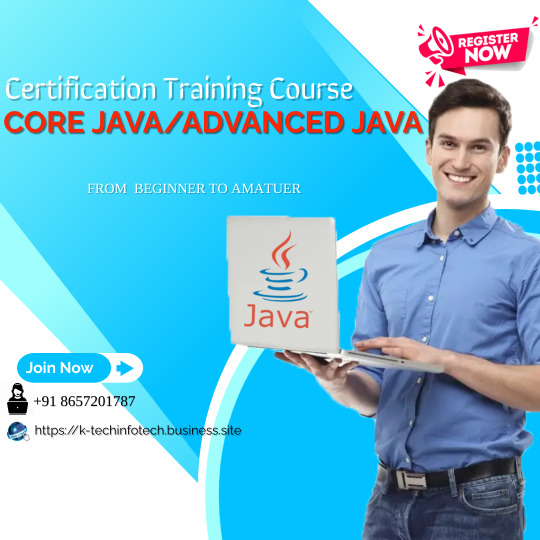
In the realm of programming languages, Java Course stands tall as a cornerstone of software development. Its versatility, reliability, and widespread use across industries make it a must-know for aspiring developers and seasoned professionals alike. At K-Tech Infotech, we’re excited to launch our comprehensive Java Course, designed to equip you with the skills and knowledge needed to thrive in the ever-evolving tech landscape.
Unveiling Our Java Course
Our Java Course isn’t just another tutorial series; it’s a holistic learning experience meticulously crafted to cater to beginners and advanced learners. Here’s a glimpse of what makes our course stand out:
1. Structured Curriculum
Foundations of Java: Dive into the basics, from syntax and data types to object-oriented programming principles.
Advanced Concepts: Explore multithreading, collections, generics, and more, delving into the intricacies of Java development.
Project-Based Learning: Apply your knowledge through hands-on projects, solidifying your skills and boosting your portfolio.
2. Expert Guidance
Our instructors are industry experts with a passion for teaching. Benefit from their wealth of experience as they guide you through complex concepts, offer practical insights, and mentor you every step of the way.
3. Flexibility and Support
We understand the importance of flexibility in learning. Our course is designed to fit into your schedule, with on-demand lessons and resources. Moreover, our support team is always available to assist you, ensuring a smooth learning journey.
4. Real-world Applications
Java isn’t just about theory; it’s about building real applications. Our course emphasizes practical application, empowering you to develop solutions that mirror real-world scenarios.
Why Learn Java with Us?
Industry Relevance: Java remains in high demand across various sectors, ensuring ample career opportunities.
Career Growth: Mastering Java opens doors to roles in software development, mobile app creation, web development, and more.
Community Engagement: Join a vibrant community of learners, collaborate on projects, and stay updated with the latest industry trends.
Ready to Embark on Your Java Journey?
Whether you’re an aspiring developer or a professional seeking to expand your skill set, our Java Course at K-Tech Infotech is the launchpad you need. Take the first step towards mastering Java Courseand unlock a world of opportunities in the tech sphere.
Enroll today and step into the exciting realm of Java Course development with K-Tech Infotech!
To learn more or enroll in our Java Course, visit https://k-techinfotech.business.site
Stay tuned for more updates, insights, and tech expertise here at K-Tech Infotech!
2 notes
·
View notes
Text
Mastering Java A Comprehensive Online Training Experience
Introduction:
In the fast-paced realm of software development, Java stands as a cornerstone programming language, powering applications across diverse domains. To harness the full potential of Java, our online training program offers an immersive and comprehensive learning experience. Whether you're a novice eager to embark on your coding journey or an experienced developer aiming to refine your Java skills, our course is meticulously designed to cater to all skill levels.
Section 1: The Importance of Java in Today's Tech Landscape
Java's robustness, portability, and versatility make it a preferred choice for building scalable and secure applications. With a vast community and an extensive ecosystem of libraries and frameworks, Java continues to be a driving force in the software development industry. Our Java online training program recognizes the significance of this programming language and aims to empower individuals with the skills needed to navigate the intricacies of Java development confidently.
Section 2: Curriculum Overview
Our Java online training curriculum is structured to provide a comprehensive understanding of the language, covering both fundamental and advanced concepts. The course begins with an introduction to Java basics, including variables, data types, and control structures. As participants progress, they delve into more complex topics such as object-oriented programming, multithreading, and exception handling.
The curriculum is enriched with real-world examples and hands-on projects to ensure practical application of theoretical knowledge. Participants will gain a deep understanding of Java's syntax, best practices, and design principles, setting the stage for proficient and efficient coding practices.
Section 3: Interactive Learning Platform
Learning Java is not just about reading textbooks; it's about hands-on experience and practical application. Our online training platform is designed to provide an interactive and dynamic learning environment. Participants have access to a variety of resources, including video lectures, coding exercises, quizzes, and collaborative projects. The platform fosters a sense of community, allowing participants to engage with instructors and fellow learners, enhancing the overall learning experience.

Section 4: Industry-Relevant Projects
To bridge the gap between theoretical knowledge and real-world application, our Java online training program includes industry-relevant projects. These projects are designed to simulate actual development scenarios, giving participants the opportunity to apply their skills in a practical setting. Working on projects enhances problem-solving abilities, promotes creativity, and prepares participants for the challenges they may encounter in their professional careers.
Section 5: Expert Guidance
Our team of experienced instructors comprises industry professionals with extensive Java expertise. Participants benefit from their wealth of knowledge, receiving guidance on best practices, industry trends, and valuable insights. The interactive nature of the online training program allows for direct communication with instructors, ensuring that participants can seek clarification, ask questions, and receive personalized feedback.
Section 6: Flexibility and Accessibility
Recognizing the diverse schedules of our participants, our Java online training program is designed to be flexible and accessible. Whether you are a full-time professional, a student, or someone with other commitments, our asynchronous learning model allows you to progress through the course at your own pace. Additionally, the course materials are accessible from anywhere with an internet connection, providing the convenience of learning from the comfort of your own space.
youtube
Section 7: Certification and Career Support
Upon successful completion of the Java online training program, participants receive a certification that validates their skills and knowledge. This certification is a valuable asset for both entry-level developers and experienced professionals seeking career advancement. In addition to the certification, our program offers career support services, including resume building, interview preparation, and job placement assistance, empowering participants to make a seamless transition into the workforce or advance within their current roles.
Conclusion:
Mastering Java is a journey that opens doors to a world of opportunities in software development. Our Java online training program is crafted with precision, offering a holistic and engaging learning experience. Whether you are starting from scratch or looking to enhance your Java skills, our program equips you with the knowledge, practical experience, and industry insights needed to thrive in the dynamic landscape of java full stack developer. Join us on this transformative learning journey and unlock your full potential in the world of Java programming.
#JavaTraining#JavaProgramming#CodeLearning#JavaDevelopment#ProgrammingEducation#JavaCertification#TechTraining#Youtube
2 notes
·
View notes
Text
Hacks to Speed Up Your C++ Development

Introduction:
Are you a computer science student looking to boost your productivity in C++ development? Whether you're working on projects, assignments, or preparing for a career in software development, optimizing your C++ development process can save you time and effort. In this blog post, we'll share some helpful hacks and productivity tips to speed up your C++ development workflow.
Use an Integrated Development Environment (IDE): Investing in a good IDE tailored for C++ development can significantly enhance your productivity. IDEs like Visual Studio, CLion, or Code::Blocks offer features such as code auto-completion, syntax highlighting, and debugging tools that streamline the coding process.
Learn Keyboard Shortcuts: Familiarize yourself with keyboard shortcuts for common tasks such as navigating code, finding references, and refactoring. Mastering keyboard shortcuts can save you valuable time by eliminating the need to manually perform repetitive actions.
Utilize Code Snippets: Take advantage of code snippets or templates to quickly insert commonly used code patterns or boilerplate code. Many IDEs allow you to create custom snippets or provide predefined templates for various C++ constructs, saving you from typing out code from scratch.
Optimize Compilation Time: Minimize compilation time by organizing your code into smaller modules, using forward declarations, and avoiding unnecessary header file inclusions. Additionally, consider enabling compiler optimizations and using precompiled headers where applicable to speed up the compilation process.
Enable Incremental Builds: Configure your IDE or build system to perform incremental builds, which only recompile the modified files instead of the entire project. This can significantly reduce build times, especially for large projects with multiple source files.
Leverage Debugging Tools: Take advantage of debugging tools provided by your IDE or compiler to identify and fix errors more efficiently. Use breakpoints, watch variables, and step-through execution to diagnose issues and understand program behavior.
Use Version Control: Implement version control using tools like Git or Subversion to track changes to your codebase and collaborate with team members effectively. Version control allows you to revert changes, track feature branches, and merge code changes seamlessly, improving code management and collaboration.
Practice Test-Driven Development (TDD): Adopt a test-driven development approach by writing tests before implementing new features or making changes to existing code. TDD helps ensure code correctness, maintainability, and facilitates faster iterations during development.
Optimize Algorithm Efficiency: Improve the performance of your C++ programs by optimizing algorithms and data structures. Choose the right algorithms for the task at hand, avoid unnecessary computations, and optimize critical sections of code for better efficiency.
Continuous Learning and Practice: Stay updated with the latest C++ standards, language features, and best practices by reading documentation, blogs, and participating in online forums or communities. Regular practice and experimentation with new techniques will help you become a more proficient C++ developer over time.
By implementing these hacks and productivity tips, you can streamline your C++ development workflow, reduce development time, and produce high-quality code more effectively. Whether you're considering enrolling in a C++ development course or seeking training at a reputable institute or training center, continuous learning and practice are essential for advancing your skills and pursuing a successful career in computer science. Happy coding!
Suggested Blogs:
Python coding techniques
Advanced Java concepts
C++ Development Trends
0 notes
Text

Master Java programming in the serene beauty of Dehradun! Our expert-led Java course offers hands-on projects, comprehensive curriculum, and a tranquil learning environment. Elevate your coding skills, from basics to advanced concepts, and stay ahead with industry-relevant tools. Join now to unlock a world of Java development opportunities amidst the picturesque landscapes of the Himalayas. Enroll for a transformative coding experience! 🌐💻✨ For more information:https://uncodemy.com/course/java-training-course-in-dehradun/
2 notes
·
View notes
Text
Experience Endless Possibilities: Excel in Java Programming
Embarking on the path of Java programming is similar to setting sail on a epic journey, filled with unknown territories, interesting challenges, and boundless opportunities. Whether your aspirations lead you to a career as a seasoned software developer, the creation of your own innovative applications, or merely the pursuit of a deeper understanding of the complex world of coding, Java serves as an ideal launching point. Renowned for its versatility and common presence in the tech landscape, Java stands as a welcoming gateway for beginners. In this all-encompassing guide, we will navigate the complex steps required to embark on your epic journey into the Java programming universe, while also unveiling the key role played by ACTE Technologies in elevating your learning experience to new heights.

How to Embark on Your Java Journey:
Set Clear Goals: Before you unfolds the sails on your Java expedition, it's imperative to chart your course with precision. What are the goals that draw you? Are you seeking a career transition into the dynamic world of software development, harboring dreams of crafting your own Android applications, or simply yearning to cultivate proficiency in the art of coding? Concretely defining your objectives serves as the compass guiding your path and ensures unwavering determination throughout your voyage.
Basic Understanding of Programming: While Java is renowned for its beginner-friendly nature, a preliminary grasp of fundamental programming concepts can be your trusted anchor. Dive into the basic aspects of coding, acquainting yourself with the likes of variables, data types, loops, and conditional statements.
Choose the Right Learning Resources: With a sea of learning resources at your disposal, it's crucial to hoist the sails on the vessel that best suits your learning style. Whether you opt for interactive online tutorials, immerse yourself in educational tomes, or prefer video courses, make a wise selection that aligns with your unique preferences. Esteemed platforms such as ACTE, Coursera, and edX beckon with comprehensive Java courses expressly designed for beginners.
Start with the Basics: Embark on your Java journey by mastering the language fundamentals. Immerse yourself in the nuances of variables, data types, operators, and the craft of composing elementary programs. Cultivate your skills through consistent practice, solidifying your newfound knowledge.
Object-Oriented Programming (OOP): Java's identity is firmly rooted in the principles of Object-Oriented Programming (OOP). Dedicate time to understand the core principles of OOP, encompassing the realms of classes, objects, inheritance, and polymorphism. These concepts form the very the foundation upon which Java development is built.
Projects and Practice: Your voyage towards Java proficiency is best undertaken through the hands-on exploration of practical projects. Embark on the construction of small-scale applications and simplistic games. This experiential learning approach not only cements your understanding but also fortifies your confidence to brave the challenges that lie ahead.
Community and Forums: As an explorer, foster engagement within the vibrant Java community. Set anchor in online forums such as Stack Overflow and Reddit, where skilled experts and fellow newbies gather. These virtual harbors are locations for acquiring guidance, sharing insights, and collaborating with kindred spirits on this grand expedition.
Advanced Topics: Once you have confidently navigated the foundational waters, it's time to set your sights on more advanced Java territories. Delve into the intricacies of databases, explore the enchanting realm of web development, and acquaint yourself with Java frameworks. These advanced facets broaden your skill set and unfurl new vistas of opportunity within the tech realm.
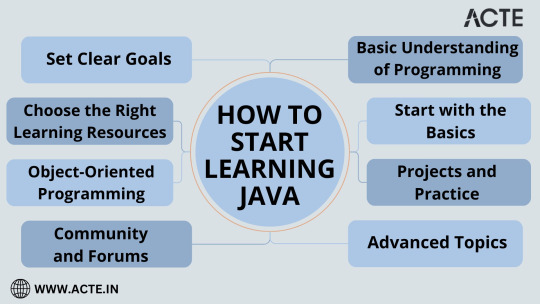
The Crucial Role of Remarkable Institute:
Your Guiding Light on the Journey: Institute stands as a beacon of guidance and expertise on your Java programming odyssey. Their comprehensive training programs offer not just knowledge, but hands-on experience, mentorship, and a meticulously charted learning itinerary. Whether you're a beginner charting your course or a seasoned mariner looking to enhance your Java skills, ACTE Institute stands as your unwavering companion, assisting you in erecting a formidable foundation in Java programming.
Mentorship and Hands-On Learning: Institute provides expert mentors who have navigated the Java seas and can provide invaluable guidance. With their support, you'll gain insights, tackle complex challenges, and refine your skills through practical applications. The institute's hands-on approach ensures that you not only grasp theory but also have the opportunity to apply your knowledge in real-world scenarios.
Structured Learning Path: Institute offers a structured learning path that takes you from Java basics to advanced topics. You'll receive a well-rounded education that prepares you for the dynamic demands of the tech industry.
Practical Projects and Real-World Experience: The institute encourages you to work on practical projects, simulating real-world scenarios. This hands-on experience equips you with the skills and confidence to excel in the field of Java programming.
Embarking on your Java programming journey is an awe-inspiring attempt filled with potential. Java's versatility and universality across a multitude of industries ensure that your newfound skills are not merely a compass, but a treasure map leading to exciting career prospects and boundless creative opportunities.
To enhance your journey and get professional advice from experienced experts, ACTE Technologies stands as your guiding light. Their comprehensive training programs offer not just knowledge, but hands-on experience, mentorship, and a meticulously charted learning itinerary. Whether you're a beginner starting your course or a seasoned professional looking to enhance your Java skills, ACTE Technologies remains your unwavering companion, assisting you in building a powerful foundation in Java programming. With their assistance, you'll be ready to go on a journey to a successful and rewarding profession in the ever-evolving field of technology.
9 notes
·
View notes
Text
Best Data Structures and Algorithms Course
Data Structures and Algorithms are the backbone of computer science. They are essential for solving complex problems efficiently, making them indispensable skills for programmers and software developers. To master these concepts, it's crucial to choose the right course. In this article, we'll explore some of the best-known courses available online, and we'll also introduce you to scholarhat's Best Data Structures and Algorithms Course, a program designed to take your understanding to the next level.
1.Udemy - Data Structures and Algorithms: Deep Dive Using JavaUdemy Data Structures and Algorithms CourseThis course provides a comprehensive understanding of Data Structures and Algorithms using Java. It covers a wide range of topics with hands-on coding exercises.
2. Scholarhat - Best Data Structures and Algorithms Course
scholarhat Best Data Structures and Algorithms Course
When it comes to mastering Data Structures and Algorithms, scholarhat's Best Data Structures and Algorithms Course stands out as an exceptional choice. With a curriculum meticulously designed by experts, this program combines theoretical knowledge with hands-on coding exercises. Moreover, the course emphasizes practical application, ensuring you're not only learning the theory but also applying it in real-world scenarios. With experienced instructors and a supportive community, this course offers an unparalleled learning experience.
3. LinkedIn Learning - Learning Data Structures and AlgorithmsLinkedIn Learning Data Structures and Algorithms CourseThis course offers a practical approach to learning Data Structures and Algorithms, with a focus on real-world applications.
4. GeeksforGeeks - Data Structures and AlgorithmsGeeksforGeeks Data Structures and Algorithms CourseGeeksforGeeks offers a plethora of tutorials, articles, and practice problems on Data Structures and Algorithms. It's a valuable resource for self-paced learning.
5. Codecademy - AlgorithmsCodecademy Algorithms CourseCodecademy provides an interactive platform for learning algorithms. The course is suitable for beginners and covers essential algorithmic concepts.
6. LeetCode - Data Structures and AlgorithmsLeetCodeWhile not a traditional course, LeetCode is a popular platform for practicing Data Structures and Algorithms through coding challenges. It's an excellent resource to reinforce your skills.
7. YouTube - MyCodeSchoolMyCodeSchool YouTube ChannelMyCodeSchool offers a series of video tutorials on Data Structures and Algorithms. The tutorials are clear, concise, and perfect for visual learners.
8. Hackerrank - Data StructuresHackerrank Data Structures CourseHackerrank offers a series of tutorials and challenges to help you master various data structures.
9. Princeton University - Algorithms Part I and Part II (Coursera)Princeton University Algorithms Part I Princeton University Algorithms Part IIThis series of courses covers fundamental algorithms and data structures, taught by renowned professors from Princeton University.
Conclusion
Selecting the right course to master Data Structures and Algorithms is crucial for any aspiring programmer. The courses mentioned above offer excellent options for learners at various levels of expertise. However, for an exceptional learning experience, consider enrolling in scholarhat's Best Data Structures and Algorithms Course. With its industry-leading curriculum and personalized support, it's the perfect choice to advance your skills in this critical area of computer science.
Enroll in scholarhat's course now. Take the first step towards becoming a Data Structures and Algorithms expert!
5 notes
·
View notes
Text
Can I become a data scientist after completing MCA?
Completing an MCA (Master of Computer Applications) can provide a solid foundation for a career in data science. An MCA can provide you with important skills that are extremely relevant to the subject, although a typical data science degree might concentrate more directly on data analytics & machine learning. While an MCA can provide a strong technical foundation, becoming a data scientist requires continuous learning, hands-on experience, and keeping up with industry trends. Leverage your MCA education, complement it with relevant data science skills, and actively engage in practical projects and networking opportunities to pave your way to a successful data science career.

Don't delay your career growth, kickstart your career by enrolling in this Data analyst course fees in chennai
Here's how you can leverage your MCA degree to become a data scientist:
Strengthen your Mathematical and Statistical Knowledge:
Data science heavily relies on mathematical and statistical concepts. Take the opportunity during your MCA program to enhance your understanding of subjects like calculus, linear algebra, probability, and statistics.
Focus on Programming and Data Manipulation:
Data scientists need strong programming skills. MCA programs typically include courses in programming languages like Java, C++, or Python. Ensure you gain proficiency in Python, as it is widely used in the data science community for data manipulation, analysis, and machine learning.
Choose Relevant Electives:
Look for elective courses related to data analysis, machine learning, data mining, or artificial intelligence within your MCA program. These courses can provide you with a deeper understanding of data science concepts and techniques.
Earn yourself a promising career in data science by enrolling in the Data Science Course In Chennai offered by 360DigiTMG.
youtube
Engage in Data Science Projects and Internships:
Seek opportunities to work on data science projects or internships during your MCA program. This practical experience will help you apply your knowledge to real-world problems, build a portfolio of data science projects, and gain valuable hands-on experience.
Self-Study and Skill Development:
Data science is a rapidly evolving field, and continuous learning is essential. Supplement your MCA studies with online courses, tutorials, and self-study materials specifically focused on data science. Platforms offer a wide range of data science courses taught by industry experts.
Take Part in Data Science Contests:
Engage in data science competitions on platforms like Kaggle. This will allow you to work on real-world datasets, learn from the community, and gain practical experience in solving diverse data science problems.
Build a Data Science Portfolio:
Create a portfolio showcasing your data science projects, including problem statements, datasets, methodologies, and outcomes. This portfolio will demonstrate your skills, knowledge, and ability to tackle data science challenges.
Network and Learn from Industry Professionals:
Attend data science conferences, meetups, and networking events to connect with professionals in the field. Engage in discussions, seek mentorship, and learn from their experiences. Online communities and forums are also great places to connect with industry experts.
Deepen your Understanding of Data Science Concepts:
Dedicate time to studying fundamental data science concepts such as machine learning algorithms, statistical modeling, data visualization, and data preprocessing techniques.
Explore advanced topics like deep learning, natural language processing, time series analysis, and big data technologies. This will give you a broader understanding of the field and open up additional opportunities.
FOR MORE DETAILS
COMPANY NAME
360DigiTMG - Data Science Course Training in Chennai, Data Analytics, AI Institute in Anna Nagar
ADDRESS
Ground floor, Fuel WorkSpaces, 25, 15th Main Rd, H Block, Anna Nagar, Ranganathan Garden, Anna Nagar, Chennai, Tamil Nadu 600040
PHONE NUMBER
1800212654321
SOURCE LINK: What are the Best IT Companies in Thiruvananthapuram
Here are some resource to check out
2 notes
·
View notes
Text
Navigating the Realm of Selenium: A Comprehensive Handbook for Automated Web Testing
Introduction: Welcome to the dynamic world of Selenium, where precision meets automation, and web applications undergo meticulous scrutiny. As a cornerstone of modern test automation, Selenium empowers testers to streamline the testing process, ensure application reliability, and expedite software delivery. In this comprehensive handbook, we'll embark on a journey through the fundamentals of Selenium testing, uncovering its core components, essential concepts, and the vast realm of learning opportunities it presents.

Understanding Selenium: Selenium stands as a testament to the power of automation in testing, providing testers with an array of tools and libraries to interact with web elements, simulate user actions, and validate application behavior across diverse browsers and platforms. Its versatility and adaptability make it a go-to choice for developers and testers worldwide. Let's dive deep into the core components and pivotal concepts of Selenium.
Core Components of Selenium: Selenium comprises several pivotal components that form the backbone of automated web testing:
Selenium IDE: Acting as a user-friendly playground for recording, editing, and debugging test scripts, the Selenium Integrated Development Environment (IDE) offers testers a seamless experience in prototyping and generating test scripts, making it equally accessible to novices and seasoned testers.
Selenium WebDriver: At the heart of Selenium lies WebDriver, a robust programming interface enabling the creation and execution of automated tests. With WebDriver, testers can directly interact with web elements using a plethora of commands, ensuring seamless cross-browser compatibility and support across various programming languages.
Selenium Grid: Enabling parallel test execution across multiple browsers and platforms, Selenium Grid revolutionizes test efficiency and scalability. By distributing test scripts across different machines, Selenium Grid reduces test execution time, facilitating rapid feedback loops and expediting software delivery.
Essential Concepts of Selenium Testing: To harness the full potential of Selenium, testers must delve into essential concepts such as:
Web Element Identification: Mastering locator strategies (ID, class name, name, tag name, link text, XPath) is paramount for accurately identifying and interacting with web elements. A profound understanding of these strategies ensures the robustness and reliability of test scripts.
Test Automation Frameworks: Integrating Selenium with test automation frameworks like JUnit, TestNG, or NUnit enhances test organization, management, and reporting capabilities, streamlining test execution and fostering collaboration among team members.
Advanced Selenium Features: Exploring advanced features such as handling dynamic elements, working with iframes and pop-ups, and implementing wait strategies enhances proficiency in Selenium automation, enabling testers to tackle complex testing scenarios with finesse and precision.
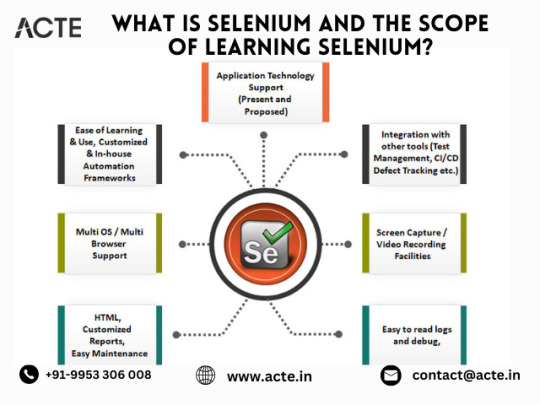
Scope of Learning Selenium: The scope of learning Selenium is vast and diverse, offering myriad opportunities for skill development and career advancement. Here are some key areas to focus on:
Programming Language Proficiency: Attaining proficiency in programming languages supported by Selenium (Java, Python, C#, etc.) is pivotal for crafting efficient and maintainable test scripts, empowering testers to automate complex testing scenarios with ease and accuracy.
Cross-browser and Cross-platform Testing: Selenium's cross-browser compatibility allows testers to validate web applications across different browsers and platforms, ensuring consistent functionality and user experience. Learning how to perform cross-browser and cross-platform testing using Selenium enriches test coverage and ensures application compatibility.
CI/CD Integration: Integrating Selenium tests into CI/CD pipelines facilitates automated testing as an integral part of the software development lifecycle, enhancing test efficiency, accelerating software delivery, and improving overall software quality.
Conclusion: In conclusion, mastering Selenium unlocks a plethora of opportunities in automated web testing. By understanding its core components, essential concepts, and the vast scope of learning opportunities it offers, testers can enhance their skills, improve software quality, and expedite the delivery of high-performing web applications. Whether you're embarking on your Selenium journey as a novice or seeking to elevate your expertise as an experienced tester, embracing Selenium testing empowers you to navigate the complexities of modern software development and drive innovation in the digital landscape. So, embark on your Selenium journey today and embark on a transformative quest in automated web testing.
3 notes
·
View notes